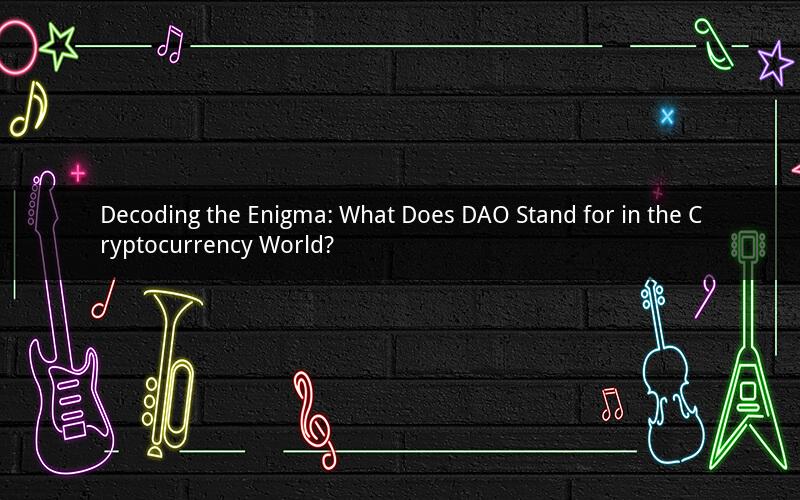
In the rapidly evolving landscape of cryptocurrencies, the term "DAO" has emerged as a pivotal concept. But what does DAO stand for in the crypto world? This article delves into the essence of DAO, its significance in the cryptocurrency ecosystem, and its potential impact on the future of digital finance.
1. What is DAO?
DAO, which stands for Decentralized Autonomous Organization, is a blockchain-based entity that operates without a central authority. It is designed to facilitate collective decision-making and management through smart contracts. In essence, a DAO is a decentralized, autonomous, and transparent organization that operates on the principles of blockchain technology.
2. How Does DAO Work?
DAOs operate on the principle of decentralization, which means that no single entity has control over the organization. Instead, decisions are made collectively by the members of the DAO, who hold tokens that represent their ownership stake. These tokens are used to vote on various proposals and decisions within the organization.
The core of a DAO is its smart contract, which is a self-executing contract with the terms of the agreement directly written into lines of code. Smart contracts automate the execution of agreements, ensuring that all parties involved adhere to the agreed-upon terms. This eliminates the need for intermediaries and reduces the risk of fraud.
3. The Significance of DAO in Cryptocurrency
DAOs have gained significant attention in the cryptocurrency world due to their potential to revolutionize the way organizations are structured and operated. Here are some key reasons why DAOs are significant:
a. Decentralization: DAOs promote decentralization by eliminating the need for a central authority. This fosters a more democratic and inclusive approach to decision-making, allowing participants from all over the world to contribute and have a say in the organization's direction.
b. Transparency: Since DAOs operate on blockchain technology, all transactions and decisions are recorded on a public ledger. This ensures transparency and accountability, making it easier to track the organization's activities and verify the authenticity of its claims.
c. Efficiency: DAOs streamline operations by automating processes through smart contracts. This reduces the need for intermediaries, cuts down on costs, and speeds up transactions, making DAOs more efficient than traditional organizations.
d. Innovation: DAOs have the potential to foster innovation by enabling new models of organization and collaboration. They can create opportunities for communities to come together and work towards common goals, driving progress in various sectors.
4. The Potential Impact of DAOs on the Future of Digital Finance
DAOs have the potential to reshape the digital finance industry in several ways:
a. Disruption of Traditional Financial Institutions: DAOs could disrupt traditional financial institutions by providing alternative, decentralized solutions for various financial services, such as lending, investment, and asset management.
b. Empowerment of Communities: DAOs can empower communities by giving them the tools to organize, collaborate, and achieve their goals without relying on centralized authorities.
c. Increased Accessibility: DAOs can make financial services more accessible to people in underbanked or unbanked regions by leveraging the power of blockchain technology to create decentralized, borderless financial systems.
5. Frequently Asked Questions about DAOs
Q1: What is the difference between a DAO and a traditional corporation?
A1: The main difference lies in their governance structure. DAOs are decentralized and operate without a central authority, while traditional corporations have a centralized management structure with a board of directors.
Q2: Can a DAO be legally recognized as a company?
A2: The legal recognition of a DAO as a company varies by jurisdiction. Some countries may recognize DAOs as legal entities, while others may not.
Q3: How do DAOs ensure security and prevent fraud?
A3: DAOs rely on blockchain technology to ensure security. All transactions and decisions are recorded on a public ledger, making it difficult for fraudsters to manipulate the system. Additionally, smart contracts automate the execution of agreements, reducing the risk of disputes.
Q4: Can a DAO be dissolved?
A4: Yes, a DAO can be dissolved through a vote by its members. If a majority of members agree to dissolve the organization, the DAO's smart contracts can be updated to terminate its operations.
Q5: What are the potential challenges faced by DAOs?
A5: Some potential challenges faced by DAOs include regulatory hurdles, security risks, and the complexity of managing a decentralized organization. Additionally, the lack of a central authority may lead to conflicts and decision-making challenges.
In conclusion, DAOs represent a groundbreaking approach to organization and collaboration in the cryptocurrency world. By leveraging blockchain technology, DAOs offer a decentralized, autonomous, and transparent alternative to traditional organizations. As the crypto industry continues to evolve, DAOs have the potential to revolutionize the way we think about finance, governance, and innovation.